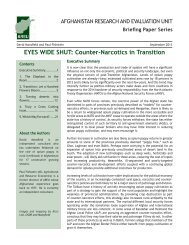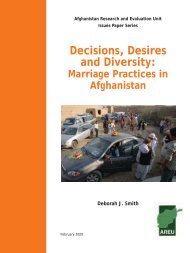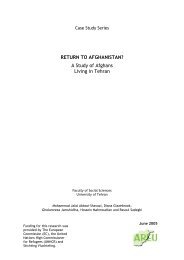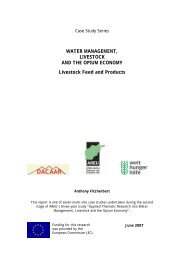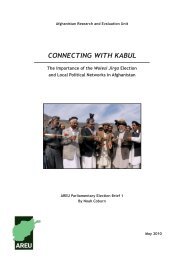Local Governance in Afghanistan: A View from the Ground
Local Governance in Afghanistan: A View from the Ground
Local Governance in Afghanistan: A View from the Ground
- No tags were found...
You also want an ePaper? Increase the reach of your titles
YUMPU automatically turns print PDFs into web optimized ePapers that Google loves.
<strong>Afghanistan</strong> Research and Evaluation Unit<br />
2011<br />
SNTV vot<strong>in</strong>g system. Although it might suit <strong>the</strong> <strong>in</strong>terests of <strong>in</strong>cumbents, <strong>the</strong> major problem with <strong>the</strong><br />
vot<strong>in</strong>g system is that it reduces accountability. As has been discussed, <strong>the</strong> current system means that<br />
elected representatives such as prov<strong>in</strong>cial councillors have little <strong>in</strong>centive to respond to anybody but<br />
a potentially very small constituency of supporters. The extension of SNTV to district councils (as and<br />
when elections take place) is likely to fur<strong>the</strong>r compound <strong>the</strong>se problems, perhaps more damag<strong>in</strong>gly<br />
so s<strong>in</strong>ce <strong>the</strong> district is a much more closely-l<strong>in</strong>ked group of communities.<br />
7.8 Corruption<br />
The issue of corruption has been a consistent feature throughout this paper. The distort<strong>in</strong>g of well<strong>in</strong>tentioned<br />
programmes <strong>in</strong>to profit-mak<strong>in</strong>g ventures, collusive l<strong>in</strong>ks between bus<strong>in</strong>ess groups and<br />
government, 133 <strong>the</strong> use of <strong>in</strong>fluence to ga<strong>in</strong> appo<strong>in</strong>tment or election to an office, <strong>the</strong> misappropriation<br />
of state funds by government employees and <strong>the</strong> extortion of bribes for <strong>the</strong> delivery of services and<br />
justice have all contributed to <strong>the</strong> malfunction of state structures and damaged its legitimacy. In<br />
certa<strong>in</strong> <strong>in</strong>stances, even traditional shuras have become corrupt—village elders were sometimes seen<br />
to deliver judgements at <strong>the</strong> direction of government officials and <strong>the</strong>n share bribes with <strong>the</strong>m.<br />
Fear of los<strong>in</strong>g <strong>the</strong>ir jobs has also compelled honest men to be <strong>in</strong>volved <strong>in</strong> corruption. The costs of<br />
such behaviour are especially high consider<strong>in</strong>g that people who are forced to pay bribes often go<br />
on to extract <strong>the</strong>m <strong>from</strong> o<strong>the</strong>rs to obta<strong>in</strong> compensation; this places a particular burden on those<br />
unfortunate enough to be at <strong>the</strong> bottom of <strong>the</strong> cha<strong>in</strong>. 134<br />
It was surpris<strong>in</strong>g <strong>the</strong> extent to which <strong>the</strong> prevalence of <strong>the</strong>se practices, and even <strong>the</strong> identity of those<br />
<strong>in</strong>volved, was common knowledge. The widespread prevalence—and <strong>in</strong> many cases acceptance—of<br />
corruption is <strong>in</strong>dicative of a systemic crisis of accountability <strong>in</strong> <strong>Afghanistan</strong>. People have no means<br />
to address blatant wrongdo<strong>in</strong>g by those who have a measure of power, and those who speak out are<br />
afraid of <strong>the</strong> consequences. The problem of corruption has been exacerbated by <strong>the</strong> large amounts of<br />
<strong>in</strong>ternational aid be<strong>in</strong>g pushed through programmes run by <strong>in</strong>stitutions that lack sufficient capacity<br />
to deliver it. The daunt<strong>in</strong>g scale of <strong>the</strong> state-build<strong>in</strong>g project, coupled with <strong>the</strong> uncerta<strong>in</strong> political<br />
environment, has thus comb<strong>in</strong>ed to focus <strong>the</strong> attention of public servants on short-term ga<strong>in</strong>. F<strong>in</strong>ally,<br />
<strong>the</strong> “bazaar economy” that Conrad Schetter 135 argues began with <strong>the</strong> decl<strong>in</strong>e of state <strong>in</strong>stitutions and<br />
adm<strong>in</strong>istrative capacity <strong>in</strong> <strong>the</strong> early 1990s has grown <strong>in</strong>to a full-fledged “war economy” under <strong>the</strong><br />
present regime—one that is almost completely dependent on conflict. As noted <strong>in</strong> <strong>the</strong> <strong>in</strong>troduction,<br />
<strong>the</strong> cost of supply<strong>in</strong>g local services to <strong>the</strong> US military alone is equivalent to <strong>Afghanistan</strong>’s GDP, while<br />
<strong>the</strong> large amounts of aid made available for time-bound projects have led to profligate expenditure.<br />
Bus<strong>in</strong>ess groups with close l<strong>in</strong>ks to <strong>the</strong> government have manipulated weak state regulations to take<br />
advantage of such opportunities. Lucrative commercial enterprises have been set up with government<br />
consent that significantly affect <strong>the</strong> way governance structures function. 136<br />
To address corruption, it is important to explore what <strong>the</strong> term actually means <strong>in</strong> <strong>the</strong> Afghan context.<br />
Accord<strong>in</strong>g to an AREU study on subnational corruption <strong>in</strong> <strong>Afghanistan</strong>, corruption is “a dynamic and<br />
adaptive phenomenon <strong>in</strong> any culture.” 137 The Afghan government deserves credit for recognis<strong>in</strong>g<br />
this and enlist<strong>in</strong>g <strong>the</strong> help of a range of <strong>in</strong>stitutions (<strong>in</strong>clud<strong>in</strong>g Integrity Watch <strong>Afghanistan</strong>, <strong>the</strong><br />
133 For an account of <strong>the</strong> near-collapse of Kabul Bank, see: Dexter Filk<strong>in</strong>s, “Letter <strong>from</strong> Kabul: The Great Afghan Bank<br />
Heist,” <strong>in</strong> The New Yorker, 31 January 2011.<br />
134 For a description of <strong>the</strong> various forms of corrupt behaviour, see: Manija Gardizi, Karen Hussmann and Yama Torabi,<br />
“Corrupt<strong>in</strong>g <strong>the</strong> State or State-led Corruption Explor<strong>in</strong>g <strong>the</strong> Nexus between Corruption and Subnational <strong>Governance</strong>” (Kabul:<br />
<strong>Afghanistan</strong> Research and Evaluation Unit, 2010).<br />
135 Conrad Schetter, “The Bazaar Economy of <strong>Afghanistan</strong>: A Comprehensive Approach” <strong>in</strong> C. Noelle-Karimi, C. Schetter and<br />
R. Schlag<strong>in</strong>tweit, (eds.), <strong>Afghanistan</strong> – A Country without a State (Frankfurt a.M.: IKO Verlag, 2000), 109-128.<br />
136 The Kabul Bank scandal has shed significant light on government relationships with <strong>in</strong>fluential private companies. For an<br />
analysis see Mart<strong>in</strong>e van Bijlert, “The Kabul Bank Investigations; Central Bank Gives Names and Figures,” 2 May 2011, http://<br />
aan-afghanistan.com/<strong>in</strong>dex.aspid=1663 (accessed 12 June 2011).<br />
137 See: Gardizi et al., “Corrupt<strong>in</strong>g <strong>the</strong> State or State-crafted Corruption” This po<strong>in</strong>t assumes even greater significance<br />
when set aga<strong>in</strong>st examples of corruption permeat<strong>in</strong>g <strong>in</strong>to and becom<strong>in</strong>g <strong>in</strong>stitutionalised <strong>in</strong> traditional structures, through<br />
<strong>the</strong>ir engagement with <strong>the</strong> state. Follow<strong>in</strong>g <strong>from</strong> this description, as <strong>the</strong>re can be changes <strong>in</strong> <strong>the</strong> ways societies perceive<br />
corruption, <strong>the</strong> prevalence of corruption too can <strong>in</strong>duce societal change.<br />
<strong>Local</strong> <strong>Governance</strong> <strong>in</strong> <strong>Afghanistan</strong>: A <strong>View</strong> <strong>from</strong> <strong>the</strong> <strong>Ground</strong><br />
62



